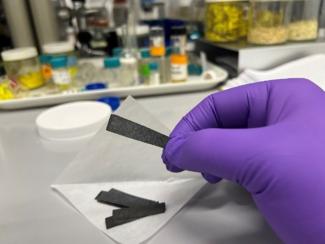NETL researchers are studying how sorbents used in Direct Air Capture (DAC) technologies degrade and working on ways to accurately predict sorbent’s lifetimes and limit degradation.
In DAC technologies CO2 is separated from ambient air and delivered in a compressed form for storage or reuse. Sorbents based on a polymeric amine degrade when exposed to air, humidity, and heat. NETL researchers are testing a sorbent they developed that is based on a molecular amine to understand the aging process. The results could lead to more efficient and cost-effective use of DAC to attain a carbon-pollution-free power sector by 2035 and a greenhouse gas (GHG)-neutral “net-zero” economy by 2050.
With a long successful history in advancing technologies to capture CO2 from the flue gas streams produced by power plants and other industries NETL expertise was tapped to intensify research on development of DAC technologies. In 2022, Congress authorized $25 million for a new NETL DAC Center, at the Lab’s research campus near Pittsburgh, Pennsylvania.
DAC technologies use sorbents to pull CO2 directly out of the air in contrast to point source capture processes that captures the greenhouse gas at power plants or industrial facilities. In a typical porous sorbent-based DAC process, ambient air is pushed into a chamber that contains the sorbent, which adsorbs CO2. Pre-heating and a vacuum are applied to remove residual air. The sorbent is then regenerated with heat/steam or electricity, producing CO2 for storage or reuse and enabling the sorbent to be reused.
Unfortunately, the sorbent materials are vulnerable to oxidation and thermal degradation in the adsorption and regeneration processes, which, over time, can result in reduced effectiveness in CO2 capture and the possible emission of unwanted pollutants. Key parts of the research are designing, testing, and validating accelerated aging tests that will help predict long-term aging. By improving the understanding of sorbent degradation, NETL researchers will be able to ensure better, safer DAC implementation and their new DAC Center in Pittsburgh, Pennsylvania will help reduce the needed time for testing new materials.
According to NETL’s Jan Steckel, Ph.D., one of the goals of NETL’s DAC Center research is to ensure better, safer DAC implementation and a reduction in the amount of time needed for testing new materials.
“Models show that a reasonable cost for operating a DAC facility requires a sorbent that can last for hundreds of thousands of cycles,” she explained. “Verification of sorbent lifetime requires an expensive long-term test subjecting the sorbent to DAC process conditions. The development of validated accelerated aging tests that can predict a sorbent’s lifetime is an important contribution to the community. We are combining experiments with computational research to understand the mechanisms leading to sorbent break down under various conditions. Amine degradation could lead to possible release of harmful contaminants like organic nitrogen compounds or ammonia. That’s why our work is important from cost, safety and efficiency aspects.”
In addition to investigating the causes of degradation, NETL is investigating options for reducing degradation. Researchers at NETL are studying alternative methods of regeneration that would require much lower temperatures. For example, researchers have coated a DAC sorbent on a conductive carbon support to explore the possibility of using resistive heating for regeneration. This material can be regenerated with temperatures as low as 50 degrees C, significantly reducing the potential for degradation.
One feature of NETL’s new DAC Center will be the ability to provide accelerated aging experiments on DAC sorbents providing important cause and effect degradation evidence. That information can help researchers develop additional approaches to reducing or preventing degradation.
NETL is a DOE national laboratory that drives innovation and delivers solutions for an environmentally sustainable and prosperous energy future. By using its world-class talent and research facilities, NETL is ensuring affordable, abundant and reliable energy that drives a robust economy and national security, while developing technologies to manage carbon across the full life cycle, enabling environmental sustainability for all Americans.




